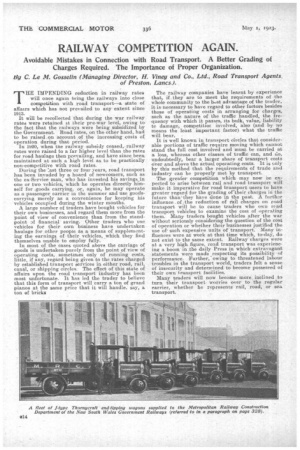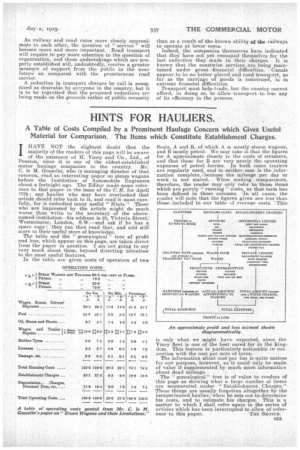RAILWAY COMPETITION AGAIN.
Page 14

Page 15

If you've noticed an error in this article please click here to report it so we can fix it.
Avoidable Mistakes in Connection with Road Transport. A Better Grading of Charges Required. The Importance of Proper Organization.
Hy C. Le M. Gosselin (Managing Director, H. Vineg and Co., Ltd., Road Transport Agents, of Preston, Lancs.).
THE IMPENDING reduction in railway rates will once again bring the railways into close competition with road transport—a state of affairs which has not prevailed to any extent since 1913. .
It will be recollected 'that during the war railway rates were retained at their pre-war level, owing to the fact that the railways were being subsidized by the Government. Road rates, on the other hand, had to be raised .on account of the increasing .costs of operation during that period.
In 1920, when the railway subsidy ceased,. railway rates were raised to a far higher level than the rates for road haulage then prevailing, and have since been maintained at such a high level as to be practically non-competitive with road rates.
During the last three or four years, road transport has been invaded by a hoard of newcomers, such as the ex-Service man, who has invested his savings in one or two vehicles, which he operates directly -himself for goods carrying, or, again, he may operate as a passenger carrier in the summer and use goodscarrying merely as a convenience for keeping ins vehicles occupied during the winter months.
A large number of traders have bought vehicles for their own businesses, and regard them more from the point of view of convenience than from the standpoint af financial' saving. Other traders who use vehicles for their own business have undertaken haulage for other people as a means of supplementing the earnings of their vehicles, _which they find themselves unable to employ fully.
In most of the cases quoted above the carriage of goods is undertaken purely from he point of view of operating costs. sometimes only of running costs, little, if any, regard being given to the rates charged by established transport services in either road, rail, canal, or shipping circles. The effect of this state of affairs upon the road transport industry has been most unfortunate. It has led the trader to believe that this form of transport will carry a ton of grand pianos at the same price that it will handle, say, a ton of bricks
The railway companies have learnt by experience that, if. .they are to meet the requirements of the whole community to the best advantage of the trader, it is necessary to have regard to other factors besides those of operating costs in arranging for charges, such as the nature of' the traffic handled, the frequency with which it passes, its bulk, value,liability to damage, competitior involved, also(and by no means the least important factor) what the traffic will bear.
It is well known in transport circles that considerable portions of traffic require moving which cannot stand the full cost involved and must be carried at a loss, whereas other classes of traffic can, and do, undoubtedly, bear a larger share of transport costs Over and above the actual operating costs. it is only by this method that the requirements of trade and industry can be properly met by transport.
The greater competition which may now be expected to arise between rail and road transport will make it imperative for road transport users to have greater regard for the grading ortheir charges iii the future than-they have done in the past. A further influence. of the reduction of rail Charges on read transport will be to cause traders who own read transport vehicles to examine the cost of operating them. Many traders bought vehicles after the war without seriously cOnsidering the question of the cost of operation or whether their businesses justified the use of such expensive units of transport: Many influences were at work at that time which, to-day, do not exist to the same extent. Railway-charges were at a -very high .figiire, road transport was experiencing a boom in .the daily Press in which extravagant. statements were made .respecting its possibility of performance. Further, owing to threatened labour troubles in the transport world, traders felt a sense of insecurity and determined to become possessed of their own transport facilities.
Many traders will now become more, inclined to turn their transport worries over to the regular carrier, whether he represents rail, road, or sea transport.
As railway and road rates more closely approximate to each other, the question of " service will become more and more important. Road transport will require to pay more attention to the question of organization, and those undertakings which are.properly established will, undoubtedly, receive a greater measure of support from the public in the near future. as compared with the promiscuous road carrier.
A reduction in transport charges by rail is reoognized as desirable by eviTyone in the country, but it is to be regretted that the proposed reductions are being made on the grounds rather of public necessity than as a result of the known ability of the railway:, to operate at lower costs, Indeed, the companies themseives have indicated that they have not yet recouped themselves for the last reduction they made in their charges. It is known that the coastwise services are being maintained under great:financial difficulties. Canals appear to be no better placed and road transport, so far as the carriage of goods is concerned, is in extreme financial difficulties.
Transport must help trade, but the country cannot afford, in doing so, to allow transport to lose any of its efficiency in the process.
































